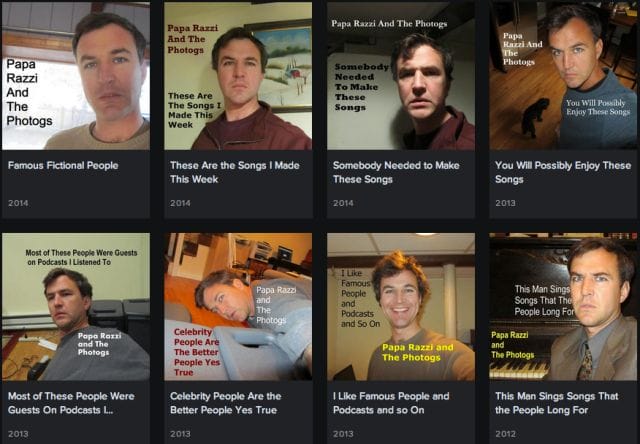
He may be the most prolific songwriter whose name you’ve never heard. From his home in Danvers, Massachusetts, Matt Farley has created and released over 15,000 songs. He even spent more than a few minutes on some of them.
Farley is a musician and filmmaker who releases projects from Motern Media, a brand he created “so he could release the music and movies he made with his friends.” But releasing music and movies you make with your friends is rarely financially rewarding, so Farley turned to a strategy more often associated with business buzzwords like growth hacking or search engine optimization than with songwriting: getting his songs to appear at the top of search results.
As Farley told The Guardian, he thought of the idea when he realized that people searched for songs on music sites with random words. People downloaded a song by his band with the word “monkey” in its title significantly more than other songs. So, Farley decided to make a song for anything someone might search for.
That was in 2008. Farley now has 15,000 tracks popping up in search results in Spotify, Google, and iTunes. One tactic includes songs for guys to use to ask girls out to prom, with each variation using a different girls name. An album about Famous Fictional People includes the songs “Detective Sherlock Holmes is a Good Detective” and “Hannibal Lecter, Scary Man.” Another album covers conspiracy theories like Area 51.
Sherlock Holmes is wonderful detective
Sherlock Holmes is very good at solving crimes
Sherlock Holmes has got a really, really good brain
~Farley’s “Detective Sherlock Holmes is a Good Detective.” It leads directly into the next song: “Dr. John Watson Helps Sherlock Holmes.”
Farley’s approach is to create minimum viable albums. He plays his keyboard and sings from his basement, skipping expensive studio sessions. Many lyrics he improvises, and none aspire for lyrical genius. Cover art mostly consists of pictures of Farley’s face with photoshopped text on top. BDCwire describes his bare bones process:
He records the songs on a Tascam Digital 24-track recorder he bought in 2009, mixes directly to the CD-R burner built into the unit, forgoes the (quite expensive) mastering process, and snail-mails the finished album to CD Baby (an online music distributor for independent musicians) to its headquarters in Portland, Ore. A few weeks later, his new compositions are available digitally to anyone in the world with an Internet connection. CD Baby charges $50 per album and that dollar figure is, literally, the only financial risk Farley takes with each album.
Farley admits, “I can get 100 of those recorded in a day. It’s not fun at all.” But it’s been remarkably successful. He reports that 90% or so of his albums make more than their $50 cost, and he spends only 3 days a week making the albums and netting around $23,000 a year, leaving the rest of his time for creative pursuits.
His actual band, Moes Haven, is an earnest songwriting duo that has been making music since 1996. Unsurprisingly, it has a whopping 25 albums. And to give an example of one of Farley’s movies (his website says Motern Media releases a movie “every few years”), he describes one, shot on a $10,000-$12,000 budget that earned both bafflement and praise for its originality:
“I play a young adult who has been tormented by an oppressive father for years until I snap, go on a killing spree. During that killing spree, I happen to bump into a bunch of monsters in the woods. Years later, the monsters are back and killing a lot of people, so they free me from the institution to save the town.”
Although his mass produced albums have uncharitably been called spam, and it’s not exactly a labor of love, Farley’s music does seem to bring more joy than your average Internet scheme. He describes his process as filling in the blank, “I wonder if anyone would want to hear songs about ______.” Apparently many people do. Farley leaves his actual phone number in several of his songs. Many musicians would probably enjoy receiving as much positive feedback as Farley. BDCwire quotes Farley:
“Sometimes people dial the number after hearing it. Lately, I’ve been averaging at least two calls every day. Often, the conversations are a little strained because the callers are so shocked I answered that they don’t know what to say. But the reaction is around 90 percent positive. Sometimes it’ll be a group of kids calling who want to mess with me. That’s not as much fun.”
This post was written by Alex Mayyasi. Follow him on Twitter here or Google Plus. To get occasional notifications when we write blog posts, sign up for our email list.



